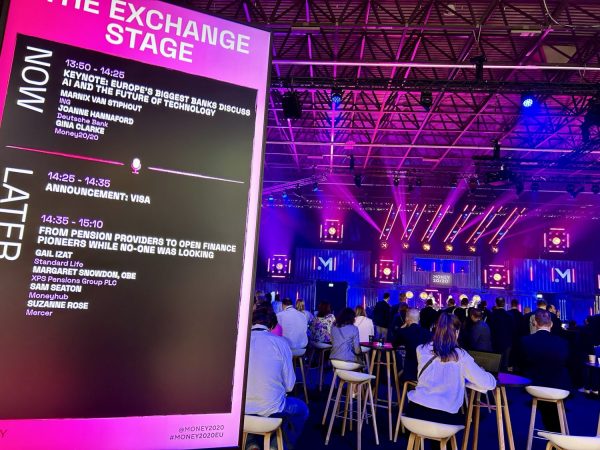In early June, the biggest and most exciting event in the payments industry, Money 20/20 Europe, returns to Amsterdam. Last year’s edition highlighted transformative shifts in AI, open banking, digital currencies, and personalized payments, setting the tone for what’s next in financial services. Read the 2024 Money2020 recap below.
Takeaways
- Innovation is no longer optional — AI, open banking, embedded finance, and real-time payments are driving rapid change
- The industry is cautiously optimistic, balancing growth with increasing regulatory and fraud challenges
- Partnerships and collaboration are critical to solving fintech’s biggest challenges
- Money20/20 Europe reaffirmed its role as the central hub for fintech transformation in Europe and beyond.
- AI in finance: Beyond the hype
AI was the dominant theme, with a shift from buzz to practical application. Fraud prevention remains the top use case — identifying suspicious patterns in real time. Attendees expressed concern over AI-driven fraud (e.g., deepfakes) and how liability rules could burden banks and PSPs. Personalization powered by AI is growing, enabling smarter customer experiences. Tech leaders (e.g., Microsoft, NVIDIA) emphasized the importance of purpose-built GenAI tools using first-party data.
- Open Banking & Open Everything
Open banking is gaining momentum, especially with Pay by Bank and commercial VRPs for seamless subscription models. Still, adoption by merchants and banks remains a challenge — regulators like the PSR may step in on pricing and mandates. The SPAA scheme faces resistance from banks, despite strong fintech support. Looking ahead, Open banking evolves into “Open Everything”, embedding finance into sectors like healthcare and mobility.
- Digital Payments & EU Sovereignty
There’s growing pressure to establish a pan-EU payment champion. The European Payments Initiative (EPI) and its branded solution ‘Wero’ is gaining traction, but adoption is still limited. The Digital Euro remains uncertain due to political hesitancy; some fear disruption for merchants and customers.
- Cross-Border & Digital Currencies
CBDCs, stablecoins, and blockchain-based solutions were heavily discussed. While cross-border real-time payments remain a long-term goal, near-term efforts focus on enhancing specific corridors. Trust and privacy remain key obstacles to mainstream digital currency adoption.
- Embedded Finance & Personalization
Embedded Finance takes center stage. Financial services are being woven into non-financial platforms, creating contextual offerings — from B2B lending tools to in-app investments. AI insights drive this trend, helping providers deliver tailored, relevant solutions in real time.
- Rise of B2B Fintech
A noticeable pivot from consumer-focused apps to B2B financial models. Mid-market firms are now attracting the majority of investments (sub-$100M), signaling diversified innovation and scalability.
- Collaboration, not competition
A major theme was the convergence of banks and fintechs — not as rivals, but as partners. Areas of collaboration: open banking, fraud prevention, compliance, digital ID, and infrastructure. The Money2020 2024 key message: banks bring scale; fintechs bring innovation.
- Cloud & SaaS in payments
Although cloud migration is top of mind, actual investment lags behind intent. There’s growing interest in SaaS-based payment systems, offering scalability and flexibility — but execution is still catching up.
- Tokenization: High hopes, slow progress
Despite strong belief in its potential to streamline asset trading, tokenization adoption remains sluggish. Experts emphasized long-term benefits in reducing friction and reliance on paper-based systems.
- Regulation & Compliance
PSD3 and PSR raised concerns, especially around Limited Network Exclusion (LNE) and screen scraping bans. Fintechs worry about the impact of API reliability standards and fraud liability rules. DORA (Digital Operational Resilience Act) and instant payments timelines are tight — banks may struggle to comply without regulatory flexibility. There is consensus about fraud that will spike as payments become faster, and more consumer education is needed.
Big announcements and partnerships
Last year’s event also brought a wave of partnership announcements:
- Mastercard and bunq launched an open banking collaboration, allowing users to link multiple accounts via bunq’s AI-powered assistant, Finn.
- Token.io partnered with Prommt to enhance user experiences in open banking payments through hosted checkout pages.
- Turkish fintech Papara joined forces with DriveWealth to let users invest in U.S. stocks starting in October.
- EY released a report predicting increased data monetization and collaboration in the AI-powered financial future.
So far for last year’s highlights. The four content pillars of this year’s Money2020 in June 2025 are:
- Embedded Intelligence: What happens when money thinks for Itself
Developments in artificial intelligence, APIs, blockchain and more are taking money, and in some cases assets, to the next level. Money isn’t just digital, it’s intelligent now. Financial decisions are augmented by AI, and consider context and intent.
- Digital DNA: Will identity become the ultimate currency
A two-pronged theme covering identity and technology stacks. These are cornerstones of today’s always-on economy, where immediacy and convenience must meet with security, privacy and reliability.
- Governance 2.0: How do we regulate a future not yet written
The financial world is moving at lightspeed. Regulators need to move just as fast. Governance 2.0 explores how European regulators and compliance-focused innovators can harness the latest technology and fuel European growth.
- Beyond Fintech: What is the future of money?
Bold ideas and disruptive technologies are shaping our financial futures, from digital assets, to new payment rails, to quantum. Beyond Fintech combines the latest tech with an increasingly collaborative fintech market. Is there anywhere fintech can’t go?
That’s it. The Money20/20 Europe agenda can be found: https://europe.money2020.com/agenda
A list of speakers can be found here: https://europe.money2020.com/agenda/speakers

